Similarly to different fuels that are needed for a vehicle to operate, our bodies contain different fuel systems that are responsible to efficiently maximize performance for different functions. In terms of a car, the diesel fuel is said to burn more efficiently hence gains more mileage over time driven. Conversely, gas tends to burn fuel very quickly so consequently it doesn’t go as long vs its diesel counterpart.
Our bodies metabolize and use different fuel sources as well in the form of carbohydrates, proteins and fats. Each of these food groups have a specific purpose in our bodies to not only fuel our system but to build lean tissue and to repair/grow new cells. Take for instance our carbohydrate sources.
There are two kinds of carbohydrates which provide different fuel sources in our body. Each of these specific types of carbohydrates are broken down and metabolized in our bodies to be stored in the liver and muscles for energy needs.
Complex carbohydrates are metabolized more slowly in our bodies to provide a more sustained energy source as they are converted to energy at a slower rate. Some examples of complex carbohydrates are rice, yams, lentils, quinoa, oatmeal, whole grain breads etc….
Simple carbohydrates are ingested and converted to energy at a more rapid rate and are often referred as quick acting fuel. Examples of simple carbohydrates are as follows; bananas, cereal bars, gel packs, watermelon, berries. Basically all fruits and fruit juices would be quickly converted to glucose for a rapidly used energy source for our bodies.
So let’s look at examples of how these energy sources are functionally used in sport to provide fuel which is sport specific based on different activity levels. For instance, a sprinter is in need of a fuel that would provide his body on demand or quick energy sources, as this sport is explosive and short in duration. The simple carbohydrates ingested would serve to provide quick converting energy sources to fuel the legs muscles to generate the power that is needed for the sprint.
The sport of marathon running or long distance jogging would rely on more complex carbohydrates and fats to be burned at a more slower rate. The activity is more of a lower intensity and longer duration vs sprinting that demands on demand energy reserves.
One can see that there are similar fuels that provide different needs and advantages to run both efficiently and effectively to maximize performance. Remember you are what you eat and we should fuel accordingly.

